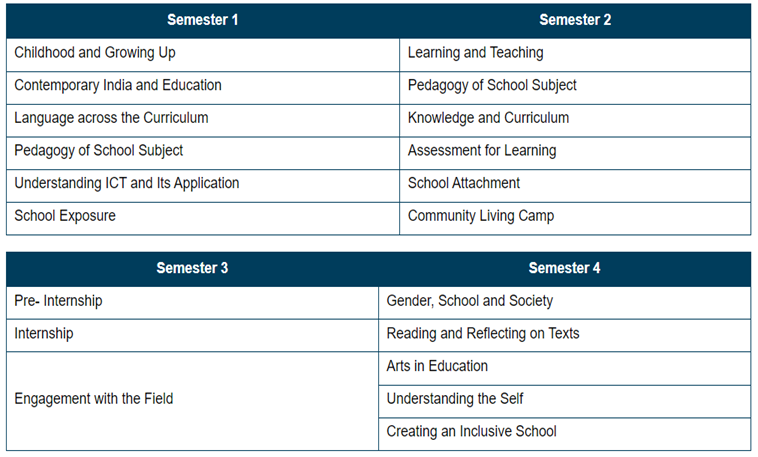Teaching has always been one of the most popular career choices among students. However, to become a teacher at pre-nursery, nursery, primary, secondary and senior secondary levels in schools or to become a professor at the college/university level, aspirants need to possess the right qualifications.

B.Ed is the bachelor’s degree undertaken to take up teaching as a profession in schools. However, it is worth knowing that a B.Ed or Bachelor of Education is not an undergraduate degree and to pursue this course one needs to have completed his/her graduation. Thus, B.Ed is a professional course and right after completing this course, students can get a job at the school level. However, it may be noted those who wish to become school teachers of senior secondary classes need to have a post-graduation degree before pursuing a B.Ed.

The B.Ed course duration is typically two years. Candidates can pursue B.Ed in distance education as well as regular mode. B.Ed course fee varies from college to college and depends on different parameters such as the type of institution (government/ private) and mode of education (regular/ distance).
B.Ed Eligibility Criteria
Before applying to the course, candidates must be aware of the required eligibility criteria for admission to B.Ed. Given below are some of the important eligibility criteria for the B.Ed course:
- Educational Qualification: Candidates need to have completed their graduation in any stream (that is, Arts, Science or Commerce) in order to fulfil B.Ed eligibility criteria. However, most popular B.Ed colleges allow candidates to take part in their admission process for B.Ed courses if they have graduated with at least 50-55% aggregate marks at the UG level.
- Age Limit: For B.Ed admissions in a majority of colleges, there is no age bar. However, the admission process of some B.Ed colleges requires candidates to be a minimum of 19 years of age.

All About B.Ed
- Why Study B.Ed? B.Ed is a undergraduate program which makes one eligible to become a school teacher. This course has been designed to revamp the educational standards of our country. To ensure uniformity in qualifications and skills, B.Ed is a compulsory course which must be pursued by anyone who wishes to make a career in the field of school education. This course is holistic keeping in view the changing school curriculum.
- Who can Study B.Ed? B.Ed is the right course for individuals who enjoy teaching kids and imparting them knowledge. It is the perfect course which opens doors to the field of school education. With greater emphasis of the government in improving literacy levels, school teachers are high in demand and this course is the right choice. Students who have already completed graduation can pursue this course from top private and government colleges.
- Benefits of Pursuing B.Ed? The growing importance of B.Ed can be seen from the fact that most of the schools have made it as a mandatory qualification for the post of TGT or PGT. Infact, Navodaya Vidhyalayas, Kendriya Vidyalayas don't recruit candidates who do not possess B.Ed. Those who aspire to rise higher in the administrative positions such as Vice-Principal and Principal must possess M.Ed as well as relevant experience. Candidates can also clear UGC-NET and start teaching career in University-level.
- Type of Courses: Students can pursue B.Ed in full-time mode from leading private and government colleges. Though distance education in B.Ed was a popular choice amongst candidates, but many state education departments are doing away with distance mode and give preference to full-time mod


B.Ed Syllabus
The curriculum of the B.Ed course is designed in such a way as to make the candidates acquainted with all the aspects that they will have to face in their profession. The teacher has to deal with classrooms of multilingual character with children from diverse socio-cultural, economic and linguistic backgrounds and varying levels of cognitive abilities. Thus, B.Ed candidates need to understand the process of learning or how learning occurs, create a suitable or conducive environment for learning and be able to provide varied opportunities for the students to observe, experiment, reflect, and question. Thus, the Bachelor of Education course curriculum is designed such that aspirants need to study the below- mentioned topics:

B.Ed Scope and Career
On completing Bachelor of Education, aspirants can become teachers at the primary, secondary and senior secondary levels in private schools. In order to be recruited in governemnt schools, students need to appear for national- or state-level teacher eligibility tests (TETs) such as CTET, UPTET, APTET and TSTET.
B.Ed Jobs and Salary
Some of the job opportunities in private and government sectors after pursuing B.Ed are listed below in the table:


Important FAQs related to B.Ed Course
Q. What is B.Ed?
A. B.Ed is a professional degree course for those who wish to pursue their career in teaching. Candidates can pursue B.Ed after completing their graduation or post-graduation. Candidates who wish to work as teachers in private or government-aided schools can pursue this course. It is a mandatory course for professionals who wish to become teachers.
Q. What is the maximum age limit for B.Ed?
A. There is usually no upper age limit to apply for the B.Ed programme. However, some universities and colleges keep the minimum age limit for candidates from 19-21 years. But there is an age limit while applying for various teaching posts. B.Ed is a pre-requisite course for becoming a teacher in any private or public school.
Q. What is the duration of the B.Ed course?
A. B.Ed is usually of two years duration. However, some universities and colleges also offer one-year B.Ed courses to students. It consists of four semesters, wherein the final semester is usually reserved for training and practical experience in teaching in any school. The course prepares individuals to be well-trained teachers who can handle children of any age.
Q. Which subjects are taught in the B.Ed course?
A. In a B.Ed course, students are usually taught subjects such as:
- • Learning and Teaching
- • Gender, School and Society
- • Assessment for Learning
- • Pedagogy of a School Subject
- • Childhood and Growing Up
- • Creating an Inclusive School
For complete details on the B.Ed course curriculum, read above.
Q. Is B.Ed a good career option?
A. With the establishment of new schools every year, teachers are always in demand in India. Also, the salaries of teachers in India have improved over the years. The government of India is giving prime importance to elementary and primary education. In view of this, multiple opportunities are available in the teaching field. Many ed-tech companies have also entered the market, hiring trained teachers. Thus, the career scope for B.Ed is good in India.
Q. How do I become a teacher?
A. To become a teacher, you need to obtain a B.Ed degree from a recognised university after completing your graduation or post-graduation. Those who finish graduation and B.Ed become TGT(Trained Graduate Teacher) whereas those who complete post-graduation and B.Ed become PGT(Post Graduate Teacher). On the basis of one's skills and choices, a candidate can teach primary or secondary or senior secondary students.
Q. How to choose a subject in B.Ed?
A. You can pursue B.Ed in the subject of your graduation or post-graduation. B.Ed is generally offered in Arts, Science or Commerce streams. Thus candidates can pursue B.A-B.Ed or B.Sc-B.Ed or B.Com-B.Ed as per their education background and choice of teaching domain. Many colleges also offer dual degree programs based on an individual's educational domain.
Q. Can I pursue B.Ed right after passing Class 12?
A. No, you can apply for a B.Ed course after passing graduation or post-graduation only. However, to become a teacher right after Class 12, you can enrol yourself in Diploma in Elementary Education (D.El.Ed) course. Since B.Ed is a professional course and is offered to those who are graduates or postgraduates, therefore candidates who wish to enter into teaching after Class 12 can pursue Diploma in Elementary Teaching, after which they can become elementary teachers.
Q. Can I get a teaching job without B.Ed?
A. Some private schools might hire candidates without a B.Ed degree. However, most schools hire candidates with B.Ed degrees only. Many top school chains such as Kendriya Vidyalayas, Jawahar Navodaya Vidyalaya or DAV Schools hire teachers who have completed their B.Ed. Therefore B.Ed is a mandatory course to establish a career in teaching.
Q. What is the salary after passing B.Ed?
A. As per PayScale, the average salary of a B.Ed graduate in India is INR 3.31 lakh per annum. The salary, however, increases as one grows in skills and experience. PGTs are offered INR 6 lakh per annum whereas TGTs are offered INR 5 lakh per annum.
Q. Will I get a government teaching job after passing B.Ed?
A. To get a government teaching job, you need to appear for TETs such as CTET, UPTET and OTET after passing B.Ed. Without passing TET, you will be ineligible to secure a teaching job in a government school.
